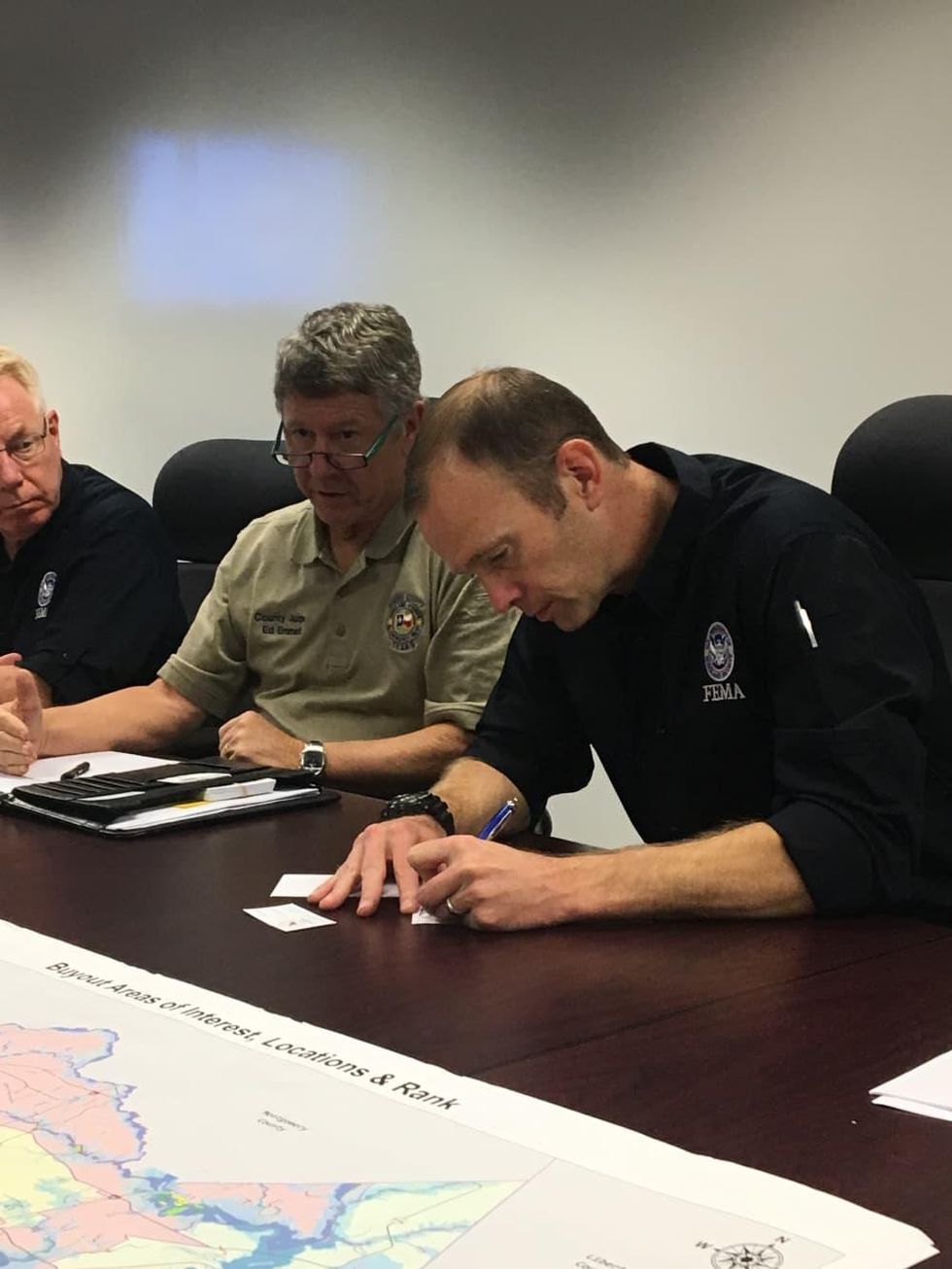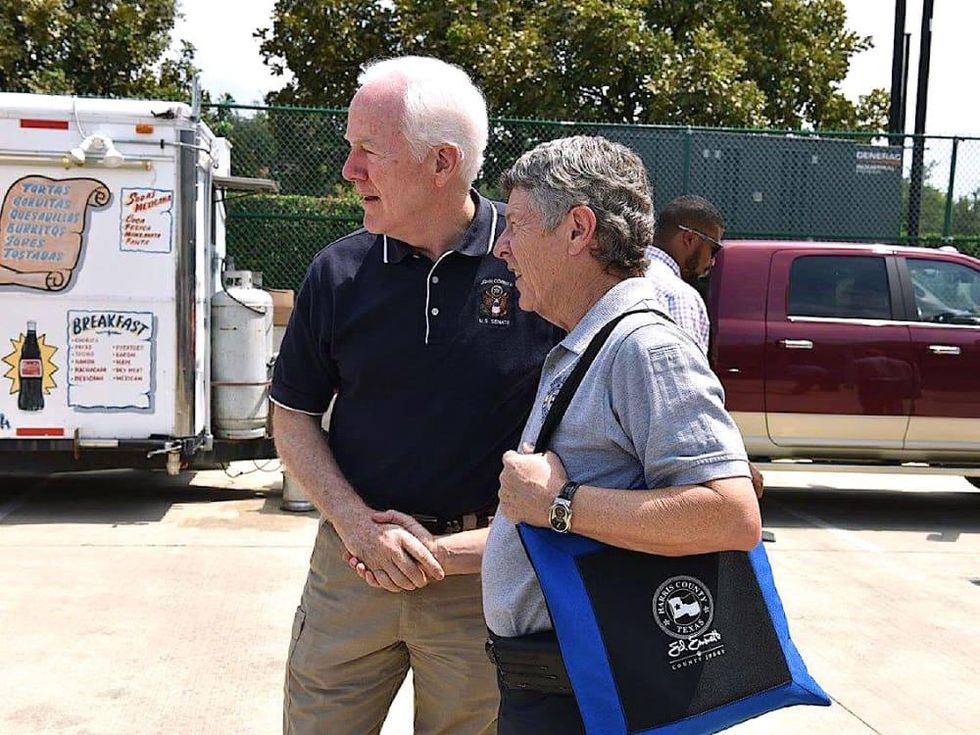After the Storm
10 Questions for Ed Emmett: County Judge reflects on Harvey and looks to the future
Ed Emmett became Harris County Judge in 2007. It’s seemingly been a wet ‘n’ wild ride ever since for the county's chief executive officer, with Hurricane Ike in 2008, the Memorial Day flood in 2015, Tax Day flood in 2016, and Hurricane Harvey in 2017.
Each time, by most accounts, Republican Emmett passed the test of leadership, earning an A+ for his steady hand, his calm in the storm. When it hits the fan, Harris County residents and Houstonians expect him to put politics aside, and work hand in hand with Democrat Houston mayors and Republican state officials. It's his style.
What a concept! Public service over partisan bickering. Emmett says he hears it all the time, “I’m a Democrat, I’ve never voted for a Republican … except for you.”
10 questions for Harris County Judge Ed Emmett:
CultureMap: How big is Harris County?
Ed Emmett: Harris County is the third-largest county in the U.S., with 1,777 square miles and 4.7 million people. That’s a larger population than 26 states. The county has 34 municipalities. Houston is by far the largest, but unincorporated Harris County contains almost 2 million people. If it were a city, unincorporated Harris County would be the fifth largest in the nation, just behind Houston and ahead of Philadelphia. By the year 2020, more people will live in unincorporated Harris County than in Houston. By comparison, fewer than 10,000 people live in unincorporated Dallas County.
CM: In your career in government, will Hurricane Harvey and recent flooding be your greatest and most enduring challenge?
EE: Over the years, I have been involved in several issues and events that took years to resolve. For example, the passage of the Ocean Shipping Reform Act took four years. Harvey, however, is very different from policy issues and even previous emergencies such as Hurricane Ike. Harvey tested the Harris County Office of Emergency Management and our partners more than any other crisis. The recovery and rebuilding effort will take much longer than similar efforts from other storms. Harvey also exposed the need for massive changes in our flood prevention and control programs. Developing a new comprehensive plan and implementing that plan will take years and will likely be my focus for the rest of my time as County Judge.
CM: How much sleep did you get during and the weeks after Harvey?
EE: As Harvey approached and during the time we were dealing with the emergency itself, I spent six nights at the Harris County Office of Emergency Management. During those six nights, I slept a total of 11 hours, I think. That was true of nearly every person who was there with me, some of whom had lost their own homes during the storm.
CM: You get a lot of credit for putting public service over party loyalty when a crisis hits Houston and Harris County. Does this come naturally to you? Do you find it odd that people are shocked when elected officials behave like adults?
EE: There is nothing partisan about responding to an emergency, so questions of politics never cross my mind.
CM: When will all of the debris in front of people’s home be picked up?
EE: Our original hope was to have all of the debris removed before the end of the year, but the county is ahead of schedule and I think the city is making good progress, too.
CM: How do you deal with people's frustrations over the debris?
EE: I have been amazed at the patience of people who have been flooded out of their homes or who still have debris on their lawns. It seems that most are willing to be patient if they see progress. For those folks who contact my office, we try to get them a clear answer. People want to know facts, even if those facts aren’t what they want to hear. The Harris County Office of Emergency Management and the rest of Harris County government are staffed by professionals who train constantly to deal with emergency situations. My decisions and actions are based upon solid recommendations from those professionals. My job is to convey accurate information to the public and to make every decision with an eye toward their safety.
CM: Have you ever suffered property damage in a storm or flood?
EE: Years ago, when I was in the legislature and living in Kingwood, Hurricane Alicia put a tree through our roof and we lost power for several days. All of our food in the freezer was ruined. But, it doesn't take personal experience to understand the need for clear decision making and communication. I will say that the only time I 'lost it' during the Harvey experience was after the storm and I drove down my daughter's street in Braes Heights and saw mountains of debris that represented entire life's memories on the curb.
CM: President Trump and the FEMA officials are getting high marks for their response to the flooding in Houston and Harris County. You met with the president when he visited Houston. What was that like?
EE: FEMA and the Trump administration have done everything possible to help our area. The appointment of Brock Long as FEMA Administrator was a great step, since Brock has spent years in charge of North Carolina emergency management. As for President Trump, after he figured out what a county judge is, he engaged with me and Mark Sloan, our emergency management coordinator, and was helpful. Working with any president is a fascinating activity. Over the years, I have met Presidents George H. W. Bush, Bill Clinton, George W. Bush and now Donald Trump. I never had the opportunity to meet President Obama, but I engaged with several members of his administration.
CM: How would you rate the local media's performance during Hurricane Harvey and the floods?
EE: Local media did an outstanding job, I thought. And with a couple of exceptions, so did the national media. The only time reporters raise my ire is when in the midst of a crisis they want to find someone to blame for a mistake. There is lots of time to assign blame after we have finished dealing with the crisis.
CM: Moving forward, you've said that you want your legacy to be improvements in the care of the mentally ill. How’s that going?
EE: Even though emergency management and flood control dominate now, and economic growth and transportation policy remain in the forefront, I still want to focus on providing more services for those with mental health issues. We must find a way to separate mental health from the criminal justice system as much as possible. There is real progress on that front. The Texas Legislature funded a Harris County jail diversion project that will allow us to better identify those with mental health issues and divert them to health services rather than putting them in jail over and over.





